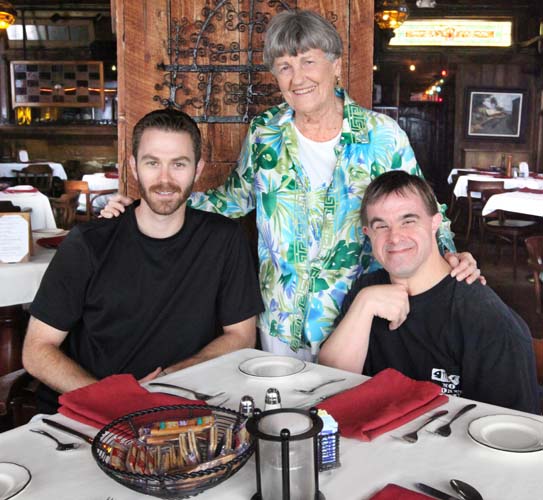
VERO BEACH — At the height of the 1960s social revolution, a lesser known, but equally transformative revolution was taking place regarding the treatment of individuals with developmental disabilities.
Refuting the then accepted practice of segregation and institutionalization; families began forming organizations to help develop the full potential of people with special needs as productive members of the community.
In this area, the push for integration into schools and society as a whole began in the mid-1970s, taking its strength from a group of educators and families who wanted their children to be afforded the same basic rights as the rest of the population.
Educators included Harry Hurst, then-head of special education for the Indian River County School District, and Lenore Quimby, owner of For Kids Only pre-school, and the first director of ARC.
“I have to give Harry Hurst great credit for being an entrepreneur for this segment of the population,” says Mary Ellen Replogle, whose son John was born with Down syndrome and attended Wabasso School until age 21. “He understood their needs and he was persuasive. As a result, he was able to provide certain types of education for this population.”
Many in the community know Replogle as the soft-spoken matriarch of the Ocean Grill restaurant dynasty.
In 1965, she and then-husband Jake obtained a 40-year lease from the Sexton family to manage the popular oceanfront establishment; since renewed to 2040.
A true family affair, son Charlie now manages the restaurant, his son Joey managing in his absence, and John works in the kitchen.
In 1976, Replogle headed up a core group of parents as board president of a newly formed Vocational Sheltered Workshop, providing an outlet for supervised fulfillment jobs.
The two groups joined in 1982 as ARC. Some 30 years later it would absorb yet another organization serving the developmentally disabled – the Sun Up Center of Indian River County. The resultant SunUp ARC has allowed for an expanded number of clients and services.
Fundraising is critical, and for the last 31 years, their restaurant has hosted Ocean Grill Night on the second Tuesday in May, donating the evenings net profits.
“This year I think we had around 345 people. For a Tuesday night in May, that’s pretty good,” says Replogle. “It was a very joyous crowd; a happy group. There are usually at least 30 or 40 clients who are there, having a good time and laughing. It’s nice to see them out enjoying themselves, and having people come up to acknowledge them. Times are changing, but not too long ago these people were kind of kept out of sight.”
Sunup ARC programs include adult education and recreation; youth outreach; behavior analysis and assistant services; four residential group homes; supported living services; in-home support and personal care assistance; transportation; supported employment, and respite care.
“The grill is very pleased to do what they do; to see the organization flourish and expand. That these people are being kept busy and useful and productive can only be helpful to the entire community. The alternative you don’t even want to think about.”
In 1964, when John was born, people were generally advised to surrender Down syndrome children to a home where they would live out their lives.
“Institutionalizing isn’t the answer – particularly with youths,” she says.
Fortunately, her forward-thinking physician encouraged them to keep John with the family, informing them that it would be to John’s best advantage and that they would not be disappointed.
“As a result, John has a brother (Charlie) and two sisters (Anne Mugler and Connie Hamm) who are very good caretakers. One of the nice results was that his older sister Anne became a teacher of exceptional children.”
Stressing the importance of daily attention and social interaction, she says, “The more you can put them successfully in the public eye, the better it is for all of us. If you can get someone into the workforce, it helps to educate the public.”
John enthusiastically works five days each week in the Ocean Grill kitchen – earning a paycheck and more importantly, the respect of his fellow workers.
Now a new complication has arisen as a result of successful advances in modern medicine. Individuals with developmental disabilities, frequently born to older women, are outliving their family caregivers.
“In times past, so many died at an early age because they had other disabilities. Down syndrome children weren’t expected to live into adulthood because of heart conditions,” Replogle explains. “John is now 48. He has no serious health problems that we can’t correct on a regular basis, so we have no reason to think that he won’t live till old age. His major caretaker – me – is not going to be around.”
Unfortunately, facilities for senior citizens with those specific disabilities are severely limited; there are none in this area.
“In my situation, John could not live in his current home; the group homes are not equipped for that. There are plenty of people in SunUp ARC who are in the same situation.”
To accommodate the growing demand, a capital campaign has been launched for the construction of two 12-bed senior adult living facilities on the SunUp ARC 5th Street property.
“It’s an ambitious undertaking, and it’s a terribly hard sell. They’re not children, they’re not cute babies, they’re not going to grow up and become more productive citizens – they’re always going to need help,” says Replogle. “Nevertheless if we don’t do this, they are going to be wards of the state. And it won’t be a happy campground; there’s nothing good about state institutions.”



